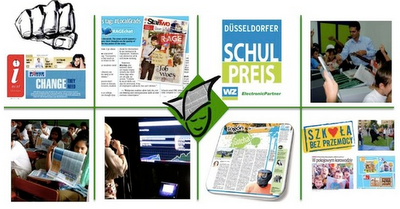Students and the News: An Update
Usar jornal na sala de aula pode parecer uma ideia antiga, mas ela pode tomar novos rumos dependendo da criatividade dos projetos. Veja abaixo, alguns exemplos de países que estão fazendo a diferença com o uso de jornais, citados pela Associação Mundial de Jornais e Editores de Notícias (WAN-IFRA) que, no ano passado, concedeu ao Brasil o primeiro e o segundo lugares para os melhores programas de jornal e educação do mundo, para os programas Ler e Pensar (Gazeta do Povo/PR) e A Gazeta na Sala de Aula (A Gazeta/ES). O texto está em inglês, como divulgado originalmente!
Using newspapers in class is an old idea that’s getting a new shine around the world in programmes assisted by the World Association of Newspapers and News Publishers (WAN-IFRA), which is promoting news literacy and helping students better understand how news is made and why.
Here are some of the most recent actions:
Botswana – Forty Botswana teachers worked with WAN-IFRA trainers from South Africa to learn the basics of using newspapers in class, as Botswana this month became the latest African country to introduce News in Education (NIE), an international programme to increase children’s academic skills by using the newspaper as a teaching tool for all kinds of subjects. Participants in WAN-IFRA’s Women in News programme helped persuade the Ministry of Education to support the approach. More on the Botswana training can be found at http://www.wan-ifra.org/node/58761
Ireland – Controversial issues including gay marriage, and societal problems such as binge drinking and obesity, were the subjects tackled by students during a Press Pass Week organised by National Newspapers of Ireland in September. Newspaper articles about these subjects, as well as photojournalism and sports and entertainment content, were compiled into a glossy magazine for the students to use during the week. The students could also enter a national competition to honour their own writing and visual journalism. The project started with a session in Dublin featuring advice from WAN-IFRA experts from around the world. More on Press Pass Week can be found at http://www.wan-ifra.org/node/44124
Denmark – A new guide introduces 13- to 16-year-olds to the printed newspaper by offering lively graphics and descriptions, plus an array of activities to further explore news in print. Authors Gitte Martens Poulsen and Aslak Gottlieb were supported by the country’s newspaper association and the organization for teachers of Danish literature. More on the guide can be found at http://www.wan-ifra.org/node/67959
“We are delighted to see the continued strength and usefulness of the printed newspaper for education as well as leadership by newspaper companies and associations in understanding the digital information arena,” said Aralynn McMane, executive director for youth engagement and news literacy at WAN-IFRA.
Projects in several countries help students navigate digital platforms and offerings.
Norway – The Norwegian Media Businesses’ Association became the first organization to contribute to a new national media literacy programme with a programme that combines teaching of traditional journalistic values with creative use of digital space. The project, “Digital School Magazine,” offers 13-year-olds and their teachers detailed guidance on how to get started. More than 60 schools are participating, including three of every five schools in Oslo. More on the project can be found at http://www.wan-ifra.org/node/67815
United States – A new, award-winning guide from the Newspaper Association of America provides guidance for using social media in student news operations. http://www.wan-ifra.org/node/44096
Other multiplatform NIE and news literacy programmes received international acclaim earlier this year:
Understanding money – The Philippine Daily Inquirer worked with two local banks in a six week programme to teach youth about how to manage money in a project that won WAN-IFRA’s top NIE World Young Reader Prize for 2012.
A community effort – Declining reading scores prompted Südwest-Presse in Germany to work creatively with individuals and businesses in the community to assure training of teachers and a supply of newspapers in the community’s classrooms. The project earned a WAN-IFRA special mention award.
Starting very young – Pre-school programmes are also making good use of the printed newspapers, as evidenced by a WAN-IFRA Enduring Excellence winner, SHZ in Germany, which has run the Zikita programme, a kindergarten NIE programme, since 2009. A video about the project can be viewed at http://www.youtube.com/watch?v=fSfS-cMC8cg
More about these and other 2012 World Young Reader Prizes winners can be found at http://www.wan-ifra.org/node/58916




Comentários
Postar um comentário